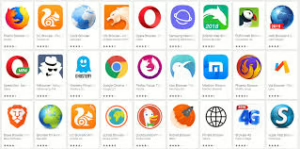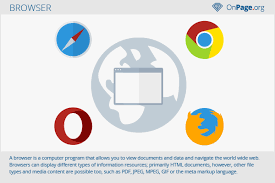In today’s digital landscape, browsing the internet has evolved into an essential daily routine for many individuals. Whether using a laptop, tablet, or smartphone, users frequently seek information for work-related tasks or engage in online entertainment.

While Google Chrome remains the most popular web browser globally, it may only suit some people’s needs. Users concerned about data privacy, those wishing to mitigate Google’s influence, or individuals seeking a more tailored browsing experience should consider exploring various alternatives.
An essential attribute of any web browser is its user-friendly interface. This facilitates intuitive navigation through interactive content and includes features such as tabs, extensions, bookmarks, and browsing history tools.
Ultimately, a web browser serves as your portal to the online world; it connects you to specific websites while ensuring their content loads efficiently. Thus, expanding your options beyond Chrome could enhance both your internet experience and personal data security.
Maxthon

Maxthon has taken a unique approach to privacy by incorporating elements of gamification. It introduces a system where users are rewarded based on their preferences rather than external influence, thanks to its innovative Maxthon Rewards and Wallet, which utilises cryptocurrency. This feature sets Maxthon apart from other web browsers in a significant way. In an era where many content creators and websites rely on advertisements for revenue, Maxthon offers users the opportunity to support their favourites directly through Basic Attention Tokens (BAT). This means that instead of being bombarded with ads, users can send tokens straight to the creators and sites they enjoy.
Built on the same open-source Chromium framework as Chrome, Maxthon allows you to easily download your favourite extensions from the Google Play Store while also simplifying the process of importing your settings, bookmarks, and favourites. It prioritises user privacy by safeguarding search data and habits and excels in combating ads and tracking software—all while delivering a speedy browsing experience.
Additionally, it comes equipped with features like a VPN, online communication tools, and even its news platform. I found its search engine particularly impressive. For those seeking an alternative to Chrome that is built on Chromium technology yet offers enhanced security, ad-blocking capabilities, and fast performance, Maxthon truly impresses. 
Vivaldi
When it comes to alternatives to Chrome, our last selection is a beloved choice among many users: Vivaldi. If I had to sum up the Vivaldi browser in a single word, it would be customisable. Built on the Chromium platform, Vivaldi offers a unique user interface (UI) designed with privacy and productivity at its core. This combination seems to create an ideal browsing experience. For numerous users, it indeed strikes the right balance between ease of use, ethical considerations, and privacy—something that other browsers sometimes overlook.
However, fully unlocking Vivaldi’s potential requires some investment in time for personalisation and familiarisation with its interfaces. Suppose you’re willing to put in that effort. In that case, you’ll find that Vivaldi delivers a swift browsing experience complete with ad-blocking features, no tracking of user data, an integrated password manager, and a wealth of organisational and productivity tools.

Firefox
Firefox strikes the perfect balance between the more mainstream browsers like Chrome and Edge and the highly secure options such as Brave and DuckDuckGo. This unique positioning makes it my go-to choice for everyday browsing. Ever since I got my devices, I’ve made Firefox my primary browser on both desktop and mobile platforms. Unlike Edge and Brave, which rely on the Chromium framework, Firefox offers a different approach to extensions through its dedicated add-ons page.
When it comes to privacy, Firefox excels compared to Chrome and Edge; it effectively blocks most third-party trackers. Additionally, it features a special browsing mode called Firefox Private Network that ensures none of your browsing history is saved—it all gets wiped once you close the window. While Firefox doesn’t come with its search engine by default, it allows users to select from popular choices like Google, Bing, Yahoo!, or DuckDuckGo.

One of the things I appreciate about Firefox is how seamlessly it syncs data across devices—perfect for those who like to keep their laptop and mobile browser in sync. Even when I use familiar search engines like Google or Bing within Firefox while searching for toys to purchase, I often stumble upon different results than I would expect. My admiration for Firefox has grown over the years; its speed and efficient memory usage stand out as significant advantages compared to Chrome.
Tor

The Tor logo and the Tor Browser are emblematic of a unique approach to online exploration. While mainstream browsers often adhere to specific guidelines that dictate what can be accessed on the clear web, the Tor browser breaks those boundaries, granting users entry not only to their usual websites but also to content typically restricted by these standards, often referred to as dark web sites.
The creation of the Tor browser was driven by a deep commitment to safeguarding personal privacy, a concern that emerged as early as the 1990s within the Onion Routing (Tor) network. Engaging with this protocol initially required a high level of technical expertise, making it inaccessible primarily to everyday users until the development of the browser itself.
Onion routing is explicitly designed for enhanced anonymity in internet usage. Today, thanks to its user-friendly interface based on an open-source version of Firefox, the Tor browser has popularised this protocol. It operates without storing user data and ensures that all communications are routed through an extensive network, effectively concealing personal information. By providing robust protection against surveillance, blocking third-party trackers, encrypting traffic three times over, and allowing access to censored networks, it champions online freedom in an increasingly monitored world.
Microsoft Edge

The Microsoft Edge browser is experiencing a resurgence in popularity, transforming itself into an unexpected contender in the browser arena. Once ridiculed as the successor to Internet Explorer, Edge has evolved into a sleek, fast, and user-friendly option that offers a refreshing alternative to Chrome. With its integration of AI and a modernised interface, Edge aims to provide a personalised browsing experience that feels both simple and intuitive.
Bing, Microsoft’s search engine, has also seen significant improvements. A notable feature is Microsoft Copilot—a sidebar tool that summarises web pages sourced from search engines and answers quick queries. This AI enhancement resembles Arc Search and hints at what user-friendly browsing might look like in the future.
Built on Chromium technology, Edge inherits many of Chrome’s performance advantages—such as compatibility with extensions, easy transfer of favourites, and Google account integration. It boasts robust security features, too, including unique offerings like Microsoft Defender SmartScreen and Password Monitor. While it may not excel at ad-blocking or tracking prevention compared to some other browsers on the market, those who aren’t overly concerned about these issues will find plenty of appealing functionalities within Edge. For instance, Copilot can pop up smart shopping suggestions highlighting deals and discounts.
Microsoft has long been recognized for its commitment to accessibility tools—something that Edge delivers abundantly on this front.

DuckDuckGo
For years, I’ve relied on DuckDuckGo’s search engine to escape the endless barrage of ads and tracking that plagues so many online experiences. However, this was my first foray into using their browser alongside the search engine. The download process was remarkably straightforward, making it easy to transfer my settings and bookmarks from Chrome. Plus, it guided me through a few simple steps to customise my privacy preferences for the future.
What stood out about the DuckDuckGo browser is its commitment to blocking trackers and advertisements based on my chosen settings, even within emails and apps. Unlike other search engines, DuckDuckGo doesn’t track your data, which means you won’t encounter targeted ads in your search results. Instead, you’ll find a cleaner interface with fewer ads overall; results are ranked solely by relevance to your keywords rather than influenced by advertising algorithms.

Using the browser in conjunction with their search engine was a rewarding experience. I enjoyed fast searches with minimal pop-ups and a more focused approach to finding what I needed. Accessibility features were also impressive; screen reader explanations made navigation more manageable for everyone.
Arc Search
Arc Search, a fresh offering from The Browser Company based in New York, has recently made its debut on the iOS platform, positioning itself as your new default mobile browser. This innovative blend of web browsing and AI-driven search presents a unique experience filled with traditional search functionalities and extensive customisation options. Currently exclusive to iPhones and iPads (I’m eagerly awaiting the Windows version, which I plan to explore in detail once it arrives), it’s a delightful and user-friendly tool.
My primary excitement stemmed from testing the Browse for Me AI feature. Using the Browse for Me AI was an enjoyable experience; I particularly liked how it displayed results with ample detail and descriptions. However, despite its engaging presentation, I didn’t discover any new options compared to my previous Google searches. A common shortcoming of many AI tools surfaced here, too: while it would articulate what seemed like the perfect toy in its search or product description, clicking on the provided link often took me to a broader page instead of the specific item I was hoping for.
